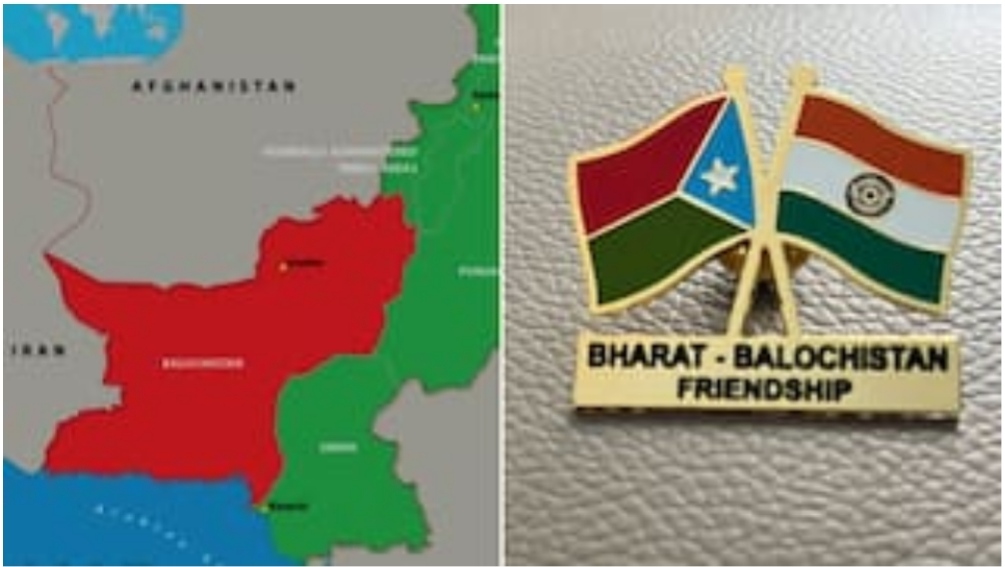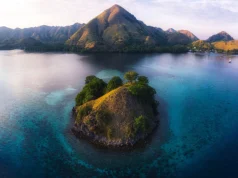Baloch Leader declares Independence of Pakistan Occupied Balochistan

Map and a flag of independent Baloch nation as shown on social media.
Baloch nationalist leaders have issued a symbolic declaration of independence of their country which has been under forced occupation from Pakistan since 1948 itself. Earlier it was a Princely State of Kalat which refused to merge with Pakistan in August 1947.
Prominent Baloch activist and writer Mir Yar Baloch said that people across Pakistan-occupied Balochistan took to the streets and voiced the demand for independence with widespread protests and declared that “Balochistan is not Pakistan,”. This has even been reported All India Radio.
Mir also urged the international community and the United Nations to recognise the “Democratic Republic of Balochistan” as a sovereign state.
Mir Yar Baloch, shared a series of statements on social media last week proclaiming the formation of a “Republic of Balochistan” and calling on the Indian government to establish a Baloch embassy in New Delhi. He also appealed to the United Nations to recognize the declaration and provide funding for basic state functions, including currency and passport issuance.
“A possible announcement soon should be done as the collapse of the terrorist Pakistan is near,” he posted on May 9. “We request India to allow Balochistan’s official office, and embassy in Delhi.”
His comments were accompanied by images of people waving Baloch flags and maps depicting an independent Balochistan. The posts come amid growing calls from Baloch leaders for greater international engagement and support, particularly from India.
The Balochistan independence movement has gained steam once again after Baloch leaders declared independence from Pakistani Occupation Forces citing decades of violence, enforced disappearances, and human rights violations in the region.
Member of Afghanistan’s Parliament in exile, Mariam Solaimankhil has sharply criticised Pakistan’s military establishment for abuses including forced disappearances and suppression of peaceful activists.
She dubbed the situation to be “forced colonisation, forced occupation”, contrary to Pakistan’s claim of counter-insurgency.
“I think everyone is sick of a military dictatorship that they’re living under,” she told ANI in an interview.
“In Balochistan, we have peaceful nonviolent activists like Dr Mahang Baloch, who’s in prison, but people like Osama bin Laden and the leaders of Lashkar e Taiba are allowed to roam freely within the country,” she added.
This rocky southwestern region of the erstwhile United India i.e. Balochistan has been a hotbed of a decades-long Liberation movement by freedom fighting groups. The region witnesses frequent attacks against the Pakistani Government,Paki army and Chinese interests in the region.
The Baloch also demand a share in the mineral-rich resources.
The Baloch Liberation Army (BLA), the biggest of the various ethnic Liberation groups — seeks independence from Pakistani Occupation. BLA accuses the Pakistan government of unfairly exploiting Balochistan’s rich gas and mineral resources.
In March, a train with 450 passengers was hijacked and the BLA claimed responsibility for the attack.
The Balochistan Liberation Army (BLA) claimed responsibility for 71 coordinated attacks across 51 locations in recent days as part of what it called “Operation Herof.” The group said it targeted Pakistani military and intelligence facilities, police stations, mineral transport vehicles, and major highway infrastructure.
In a statement issued on May 11, the BLA said a “new order has become inevitable” in South Asia and warned that Pakistan’s military setbacks and use of religious extremism had created lasting instability. The group rejected Islamabad’s overtures for ceasefire talks, describing them as a deceptive tactic, and urged regional powers, including India, not to place trust in Pakistan’s intentions.
“The BLA is neither a pawn nor a silent spectator,” the group said. “It will not rest until Pakistan is dismantled as a terror-exporting state.”
Balochistan was once part of the princely state of Kalat before being annexed by Pakistan in 1948. The move triggered the first of several insurgencies, with nationalist groups demanding greater autonomy or independence. Successive military operations by the Pakistani state have led to repeated cycles of rebellion and suppression.
Human rights organizations have documented reports of enforced disappearances, extrajudicial killings, and the targeting of civilians. The recent killing of prominent Baloch rally driver Tariq Baloch, allegedly under a “kill and dump” policy, has further inflamed tensions and drawn criticism from international rights advocates.
Balochistan’s strategic importance stems from the presence of the deep-water Gwadar Port, a critical node in the China-Pakistan Economic Corridor (CPEC). While CPEC has brought billions of dollars in Chinese investment to Pakistan, local communities say they have been excluded from its benefits and forced off their lands without proper compensation.
The port and surrounding areas have been the target of repeated attacks by Baloch insurgents, some of which have directly threatened Chinese personnel working on infrastructure projects.
In recent weeks, Baloch activists have intensified their outreach to India. Mir Yar Baloch called for the renaming of the historic Jinnah’s House in Mumbai to “Balochistan House,” framing it as a symbolic gesture of support. Social media campaigns have circulated similar demands and messages of solidarity with India.
While the declaration of independence remains symbolic and lacks formal international backing, it has significant implications for regional stability. Analysts warn it could embolden other separatist movements within Pakistan and further complicate the stability of Pakistan itself.
In what is being claimed to be its statement, BLA on Sunday criticised Pakistan’s duplicity and said it uses the language of peace as a strategic facade.
Addressing India amid the current ceasefire between the two nations following Operation Sindoor, the BLA stated: “Every talk of peace, ceasefire and brotherhood from Pakistan is merely a deception, a war tactic and a temporary ruse.”
The group described Pakistan as a “breeding ground” for global terrorists and urged the international community to declare Islamabad a terrorist state. BLA said it is “a dynamic and decisive party” in shaping the region’s future. It also signalled a geopolitical shift, declaring that “a new order has become inevitable” in South Asia.
In its statement, the Baloch Liberation Army (BLA) said that key strikes were carried out in areas such as Kech, Panjgur, Mastung, Quetta, Zamuran, Tolangi, Kuluki, and Nushki. The group claimed it targeted Pakistani military and intelligence sites, local police stations, vehicles transporting minerals, and infrastructure along major highways. The operations reportedly involved ambushes, IED blasts, sniper fire, targeted killings of Pakistani troops, and the seizure of security posts.
The BLA urged both India and the international community to take “decisive action” against Pakistan, warning that continued inaction could fuel further violence. “If Pakistan continues to be tolerated, its very existence may lead to the ruin of the entire world,” the group stated, accusing the country of fostering terrorist groups like Lashkar-e-Taiba and Jaish-e-Mohammad.
Dismissing accusations of being a proxy force, BLA maintained its autonomy in pursuing an armed campaign for Balochistan’s independence. “The BLA is neither a pawn nor a silent spectator; we are a dynamic and decisive party,” said spokesperson Jeeyand Baloch.
What Is BLA?
The Baloch Liberation Army (BLA) is the leading armed group advocating for the Baloch people’s right to self-determination. Since Balochistan’s forced incorporation into Pakistan in 1948, the Baloch community has accused Islamabad of political marginalisation, resource exploitation, and systematic state violence—including extrajudicial killings and enforced disappearances.
Despite being rich in natural resources like gas, minerals, and coastal assets, Balochistan remains among the poorest and most underdeveloped regions. The BLA opposes the extraction of these resources without local benefit and condemns the Pakistani government’s denial of Baloch rights.
According to news agency ANI, human rights organisations such as Amnesty International and Human Rights Watch report that thousands of Baloch activists, journalists, students, and political workers have allegedly been abducted or killed by Pakistani forces. Victims are often branded as “terrorists” or “foreign agents,” and families are left without justice or accountability. The discovery of mass graves in several districts has deepened public distrust and highlighted the region’s ongoing humanitarian crisis.




